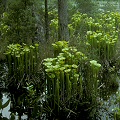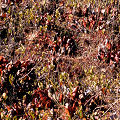Q: Why are these wetlands nutrient poor?
A: In wetlands such as isolated ponds where the water is not flushed by streams,
chemicals released by decaying plant matter can become concentrated. Acidic
compounds such as tannins accumulate and increase the acidity of the
water. When the water becomes acidic, two things happen.
First, many
microorganisms which aid in decomposition cannot survive in the highly acidic waters. As a result,
when plants die they do not rot--they just become waterlogged. With little decomposition, there are few nutrients for plants.
Second, when the soil is very acidic, it is difficult
for a plant to assimilate nutrients (which is why there are special
fertilizers available for people who grow acid-loving plants).
Both of these factors--decreased decomposition and the difficulty of obtaining nutrients
from acid water--contribute
to making wetlands nutrient-poor settings. Bog-water is sometimes so rich
in tannins it is darker than well-brewed tea, but it is actually quite
clean and odorless.
Page citations: Crum, H., & Planisek, S. 1992; Johnson, C.W. 1985;
Juniper, B.E., et al. 1989.

